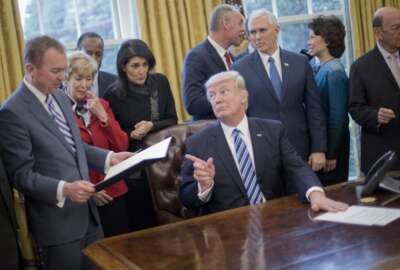
Caution: When draining the swamp, remember, it’s a very, very big swamp
Draining the swamp may sound like a good idea, but Senior Correspondent Mike Causey says it's a job that might be a lot bigger than it first seems.
The new A-team that is taking over (slowly in some cases) top government jobs mostly has a business or military background — former CEOs and generals who are being saluted. And that lack of civilian government experience at the federal level may not be a bad thing.
Some operations, and some feds, may have to reinvent themselves over the next few years. Wall Street is different from Pennsylvania Avenue.
Some people in government will have to learn (right or wrong) that programs they’ve overseen for decades may be out-of-date and out-of-touch with the client base or simply walking dinosaurs.
Some people in the new administration will have to learn that many of the people and programs they’ve pledged to eliminate or revamp are badly needed and wildly popular with taxpayers who may loathe the IRS or EPA, but love their local Agriculture Department office, local national park staff or the folks down at the Social Security office in the strip mall.
Groups representing federal workers, managers and executives know they can count on congressional Democrats to fight many cuts proposed in last week’s so-called skinny (as in first) budget. But to win Republican votes in the House and Senate, they are reaching to private groups, societies and (in the case of the EPA) to state governments to oppose cuts.
Their goal is to side-step the climate-change argument (in which EPA has been a leader of the pack) and concentrate on things like water pollution and crop contamination. Especially in red states which gave the President his electoral college victory.
There are lessons to be learned from the massive downsizing of the Clinton years when about 250,000 federal jobs were chopped using buyouts as the carrot and reductions-in-force (which are costly, messy and often hit the wrong people). Tens of thousands of federal jobs were privatized and turned over to contractors. So the federal payroll dropped, but reappeared in the private sector where privatized feds wound up making a lot more money than they did in the same jobs in government.
During the BRAC (base realignment and closure ) operation, someone official figured that every federal job brought into a city or town created, in whole or in part, six other jobs in the private sector. People who service federal workers supplying them parking, food, entertainment, homes and apartments, etc. — but such data has yet to be seen that creating or importing any job almost anywhere generates more jobs.
What the folks who have come to town to drain the swamp need to realize is that 85 percent of the federal workforce lives, works, spends and votes outside the Washington area. Feds in major centers with fewer people but a higher percentage of federal workers than D.C., probably aren’t much like their “decadent and distant” colleagues Inside the Beltway.
Huntsville, Alabama, with just about every federal agency represented, represents a miniature Washington, D.C., without the Metro and all those type A’s. Ogden, Utah — with the IRS, Interior Department and Air Force —is a major federal center. Toss a rock in Raleigh-Durham- Cary, North Carolina and chances are you will hit a well-paid federal professional. So are places in Arkansas, Montana, Idaho, North and South Carolina, as well as Florida, Texas and California and New Mexico where Uncle Sam is both a big-deal and the employer of choice. And job-generator for the private sector. The late Sen. Robert Byrd (D-W.Va.) was so successful moving federal offices into the Mountain State that many think it is D.C., with hills but minus the attitude. At one point the American Federation of Government Employees (a great outfit, but not the Teamsters) was by far the largest union in Oklahoma because of all the federal operations — from the Postal Service to the FAA and every other agency — there. The reason that homegrown anti-government terrorists chose Oklahoma City as their target in April 1995, was because the Federal Building to them was a human target-rich symbol of a massive government presence in the heartland.
Feds are used to abuse. It goes with the territory. Most can shake it off and keep doing their jobs. But they don’t need another round of bureaucrat-bashing and rhetoric about draining the swamp. Because all of the above places, including wherever you are reading this — not just D.C. —are part of the swamp too.
Nearly Useless Factoid
Hasbro will be replacing the boot, wheelbarrow and thimble playing pieces in the Monopoly board game with a Tyrannosaurus rex, a penguin and a rubber ducky.
Source: Associated Press
Copyright © 2024 Federal News Network. All rights reserved. This website is not intended for users located within the European Economic Area.
Mike Causey is senior correspondent for Federal News Network and writes his daily Federal Report column on federal employees’ pay, benefits and retirement.
Follow @mcauseyWFED





